
The Arrows of Hercules is an historical novel by American writer L. Sprague de Camp, first published in hardback by Doubleday in 1965 and in paperback by Curtis Books in 1970. The book was reissued with a new introduction by Harry Turtledove as a trade paperback and ebook by Phoenix Pick in April 2014. It is the fourth of de Camp's historical novels in order of writing, and second chronologically, set in the time of Dionysios I of Syracuse at the end of the 5th and beginning of the 4th centuries BC.

The Undesired Princess is a 51,000 word fantasy novella by American writer L. Sprague de Camp. It was first published in the fantasy magazine Unknown Worlds for February 1942. It was published in book form by Fantasy Publishing Company, Inc. in 1951. The book version also includes the 10,000 word fantasy short story "Mr. Arson", first published in Unknown for December 1941. The book was bound together with Stanley G. Weinbaum's The Dark Other in the omnibus collection Fantasy Twin by the same publisher in 1953. The title story was also published in paperback by Baen Books in 1990 together with David Drake's story The Enchanted Bunny, under the combined title The Undesired Princess & the Enchanted Bunny.

The Wheels of If and Other Science Fiction is a 1948 collection of science fiction stories by L. Sprague de Camp, first published in hardback by Shasta and in paperback by Berkley Books in 1970. It has also been translated into German. All the stories were originally published in the magazines Astounding Science Fiction and Unknown.

Sprague de Camp's New Anthology of Science Fiction is a collection of science fiction stories by American writer L. Sprague de Camp, edited by H. J. Campbell. It was first published in both hardcover and paperback in 1953 by Panther Books.

The Virgin & the Wheels is a collection of two short science fiction novels by L. Sprague de Camp, published in paperback by Popular Library in 1976. An E-book edition was published by Gollancz's SF Gateway imprint on September 29, 2011 as part of a general release of de Camp's works in electronic form.
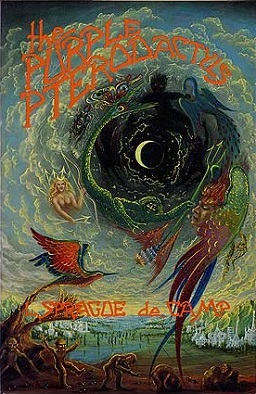
The Purple Pterodactyls is a collection of fantasy short stories by American writer L. Sprague de Camp. The collection was first published in hardcover by Phantasia Press in January, 1980, and in paperback by Ace Books in April of the same year. It has also been translated into German. An e-book edition was published by Gollancz's SF Gateway imprint on September 29, 2011 as part of a general release of de Camp's works in electronic form. The pieces were originally published between 1975 and 1979 in the magazines The Magazine of Fantasy & Science Fiction, Fantastic, Escape!, and Fantasy Crossroads.

Tales from Gavagan's Bar is a collection of fantasy short stories by American writers L. Sprague de Camp and Fletcher Pratt, illustrated by the latter's wife Inga Pratt. It was first published in hardcover by Twayne Publishers in 1953; an expanded edition rearranging the contents and adding pieces not in the first was published in hardcover by Owlswick Press in June 1978. The original illustrations were retained in this edition. It was subsequently issued in paperback by Bantam Books in January 1980. An e-book edition was published by Gollancz's SF Gateway imprint on September 29, 2011 as part of a general release of de Camp's works in electronic form. The collection has also been published in German.

The Incorporated Knight is a fix-up fantasy novel by American writers L. Sprague de Camp and Catherine Crook de Camp, the first book in their sequence of two Neo-Napolitanian novels. Chapters 1-5 first appeared as L. Sprague de Camp's short stories "Two Yards of Dragon", "The Coronet", "Spider Love" and "Eudoric's Unicorn" in Flashing Swords!, The Magazine of Fantasy and Science Fiction and The Year's Best Fantasy Stories in 1976–1977. The complete novel was first published in hardcover by Phantasia Press in August 1987, and in paperback by Baen Books in September 1988, with a trade paperback edition, also from Baen, following in 1991. An E-book edition was published by Gollancz's SF Gateway imprint on September 29, 2011, as part of a general release of de Camp's works in electronic form.

The Complete Compleat Enchanter is an omnibus collection of five fantasy stories by American authors L. Sprague de Camp and Fletcher Pratt, gathering material previously published in three volumes as The Incomplete Enchanter (1941), The Castle of Iron (1950), and Wall of Serpents (1960), and represents an expansion of the earlier omnibus The Compleat Enchanter, which contained only the material in the first two volumes. The expanded version also differs from the previous omnibus by omitting its afterword, de Camp's essay "Fletcher and I". The omnibus is the first edition of the authors' Harold Shea series to be complete in one volume. It has appeared under three different titles. It was first published in the UK in paperback by Sphere Books in 1988 under the title The Intrepid Enchanter and with a foreword by Catherine Crook de Camp. The first US edition appeared under the title The Complete Compleat Enchanter, and replaces the foreword with a preface by David Drake. That edition was published by Baen Books in 1989, and has been reprinted a number of times since. Orion Books published an edition in the UK under the title The Compleat Enchanter in 2000 as volume 10 of their Fantasy Masterworks series. The stories in the collection were originally published in magazine form in the May 1940, August 1940 and April 1941 issues of Unknown, the June 1953 issue of Beyond Fantasy, and the October 1954 issue of Fantasy.

The Pusadian series is a sequence of fantasy stories by L. Sprague de Camp, begun in the early 1950s and written under the influence of Robert E. Howard's Conan stories. The series, also known as the Poseidonis series, prefigured the numerous sword & sorcery settings of the 1960s and 1970s.
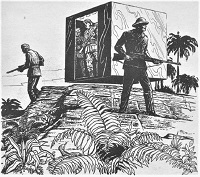
"A Gun for Dinosaur" is a classic time travel science fiction story by American writer L. Sprague de Camp as part of his Rivers of Time series. It tells the story of four men who travel into the past to hunt dinosaurs.
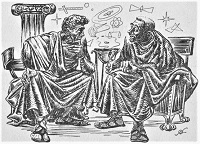
"Aristotle and the Gun" is a time travel and alternate history science fiction story by American writer L. Sprague de Camp.

"The Galton Whistle" is a science fiction short story by American writer L. Sprague de Camp, a story in his Viagens Interplanetarias series. It is the first (chronologically) set on the planet Vishnu. It was first published, as "Ultrasonic God," in the magazine Future Combined with Science Fiction Stories in the issue for July, 1951. It first appeared in book form under the present title in the collection The Continent Makers and Other Tales of the Viagens, published in hardcover by Twayne Publishers in 1953, and in paperback by Signet Books in 1971. It also appeared in the anthologies Novelets of Science Fiction, The Good Old Stuff, and The Good Stuff. The story has been translated into Portuguese, Dutch, and Italian.

"Summer Wear" is a science fiction short story by American writer L. Sprague de Camp, part of his Viagens Interplanetarias series. It is the first (chronologically) set on the planet Osiris. It was first published in the magazine Startling Stories in the issue for May, 1950. It first appeared in book form in the anthology The Best Science Fiction Stories: 1951, edited by Everett F. Bleiler and T. E. Dikty, published in hardcover by Frederick Fell in 1951, and was gathered together with other Viagens stories in the collection The Continent Makers and Other Tales of the Viagens, published in hardcover by Twayne Publishers in 1953, and in paperback by Signet Books in 1971. The story has been translated into Portuguese, Dutch, Italian and German.

"Judgment Day" is an apocalyptic science fiction story by American writer L. Sprague de Camp. It was first published in the magazine Astounding Science Fiction for August, 1955, and first appeared in book form in the anthology The Best Science Fiction Stories and Novels: 1956. It later appeared in the de Camp collections A Gun for Dinosaur and Other Imaginative Tales, and The Best of L. Sprague de Camp, as well as the anthologies Great Science-Fiction, A Science Fiction Argosy, and Masters of Darkness III. The story has also been translated into German.

"The Gnarly Man" is a science fiction story by American writer L. Sprague de Camp, about an apparently immortal Neanderthal Man surviving into the present day.

The Green Magician is a fantasy novella by American writers L. Sprague de Camp and Fletcher Pratt. The fifth story in their Harold Shea series, it was first published in the November 1954 issue of the fantasy pulp magazine Beyond Fiction. It first appeared in book form, together with "The Wall of Serpents", in the collection Wall of Serpents, issued in hardcover by Avalon Books in 1960; the book has been reissued by a number of other publishers since. It has also been reprinted in various magazines, anthologies and collections, including The Dragon, The Complete Compleat Enchanter (1989), Masterpieces of Fantasy and Enchantment (1988), and The Mathematics of Magic: The Enchanter Stories of L. Sprague de Camp and Fletcher Pratt (2007). It has been translated into Italian and German.
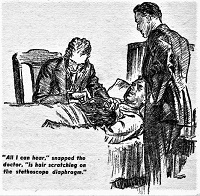
"Hyperpilosity" is a science fiction story by American writer L. Sprague de Camp. It was first published in the magazine Astounding Stories for April, 1938, and first appeared in book form in the de Camp collection The Wheels of If and Other Science Fiction (Shasta, 1949; It later appeared in the anthologies Omnibus of Science Fiction, Science Fiction of the Thirties, The Edward De Bono Science Fiction Collection, and The Road to Science Fiction #2: From Wells to Heinlein, as well as the magazine Fantastic Story Magazine and the de Camp collection The Best of L. Sprague de Camp. In 2014 the story was shortlisted for the Retro Hugo Award for Best Short Story.

"The Hardwood Pile" is a contemporary fantasy story by American writer L. Sprague de Camp. It was first published in the magazine Unknown for September, 1940. It first appeared in book form in the collection The Reluctant Shaman and Other Fantastic Tales ; it later appeared in the collection The Best of L. Sprague de Camp, and the anthology Bestiary! The story has been translated into French and German.
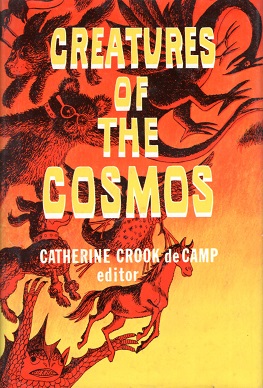
Creatures of the Cosmos is an anthology of fantasy and science fiction short stories for younger readers, edited by Catherine Crook de Camp. It was first published in hardcover by Westminster Press in 1977. It was the third such anthology assembled by de Camp, following the earlier 3000 Years of Fantasy and Science Fiction (1972) and Tales Beyond Time (1973), both of which she edited together with her husband L. Sprague de Camp.




















